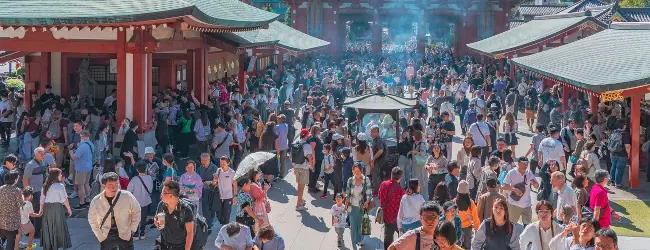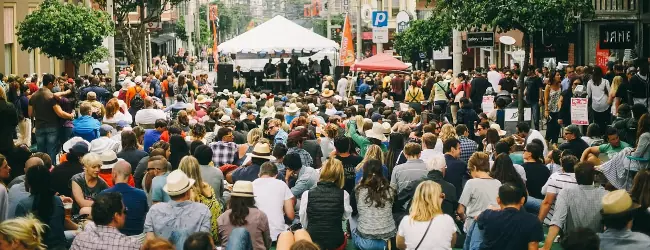Since I am now learning sewing steadily, let’s talk about something different. Let’s look at our current economic situation from a broader, historical perspective.
Why do these problems occur?
Sometimes, we want to know why the new problems occur.
Not only do we, but society also often encounters new problems. It means the world is constantly changing. The majority of social people live based on stability as a premise, so changes cause trouble.
It means that understanding the logic behind the change allows us to adapt to the new future. In addition, it can make us richer if we prepare appropriately.
Over the past 5 or 6 years, many new economic issues have appeared. These causes are mysterious, and many people are confused about how to respond to them.

One example is overtourism, a social problem of having an excessive number of visitors that negatively impacts the tourist site. Barcelona in Spain, Venice in Italy, and Kyoto in Japan are examples. Although it is delightful as a tourist destination, there are too many customers to handle. That is why they are restricting visitors.
Another example is inflation. Almost all countries are experiencing inflation, the phenomenon of decreasing money value. It makes the prices rise. You may also feel that food and energy prices have been going higher over the past 5 or 6 years. Not only groceries, but real estate and stock prices are also soaring.
This time, something is different
Although they may seem like an economic boom, that is not the case this time. The number of poor people is also increasing.
Many people are becoming richer and have started traveling to the famous places in the world, while many others are becoming poorer.

Why is such a phenomenon happening? This is a fundamentally different change from what people have experienced over the past decades.
Today, I will explain the logic behind those social problems. This logic might show you the future change and how to prepare.
The world with excess money
In my prediction, the world will gradually resemble Argentina and Turkey. These countries have long faced high inflation and a decline in currency value, ultimately having to accept their situation.
We currently live in an era where excess money is overflowing. Although we still perceive money as valuable, its worth may not be as significant as we believe. Even if a wealthy individual were to purchase every material item available in the world, there would still be money left over. In other words, money is worth less than we assume.
Central banks in each country are creating money now. The more the central bank creates money, the more the currency value will decrease in the long term.

However, it is essentially difficult to stop the central banks from making money. This is because the government requires more and more money to satisfy people. The central bank is fundamentally under the control of the government, which is driven by the votes of the people.
It means the government can pay as much money as it wants. If more than half of the people receive benefits from the government payments and vote to continue the current situation, the state will continue to create money, even if the remaining half becomes poorer.
Two civic classes
That divides the nation into two civic classes. One is the class that can receive benefits from the state. They can continue to earn money and maintain relative wealth. The other is the class that cannot receive benefits. They become poorer. These two classes tend to become evenly divided—half and half.
If the government, including the central bank, creates more money, it can easily increase the number of people on its side. Even though the amount of benefits per person will decrease, it is better than losing everything for people on the government side.

That is why the government and the currency value gradually decline. People cannot change this transition. This is because it is caused by human nature that cannot change.
Typical examples are Argentina and Turkey. Although many citizens are suffering from a weak currency, they cannot change it. Even if the opposition party wins, things will soon return to how they were.
The problem created by the two classes
Now, the whole world is starting to move in that direction. That started to cause recent problems.
Since half can earn money, the class that can benefit from the government’s payments will become wealthier. That creates the problem of overtourism. Many people started to become wealthy and enjoy traveling all over the world.

At the same time, the remaining half is getting poorer. That creates social discontent, such as extreme political parties, underground organizations, drugs, crimes, and the elimination of different types of people. Block economics is one form.
If viewed from a longer-term perspective, although many countries decline, people in a freer environment with a good location that connects to the world will create the next growth. History tells us that.
Living more rationally
This broader, long-term perspective allows us to adapt to this situation.
In my opinion, it would be reasonable to live more rationally. The world will become more chaotic due to the conflict between the two classes.
We have to consider the unexpected. The unexpected includes both good and bad. Rationality provides us with moderation and prevents us from extreme reactions that destroy us. That would make it easier to respond to the new situation.

It can be contradictory. In my case, although I love logic, I am shifting my value from being information-oriented to being material-oriented. Although I prefer frugality, I am trying to create products for wealthy people. Although I like freedom, I am also trying to make more connections with society.
Since rationality calms us down, it allows us to do various things with less stress.
Conclusion
That is the logic behind the current social problems.
The world will become more chaotic, but the unexpected includes both good and bad.
Rationality provides us with moderation and prevents us from extreme reactions that destroy us.
This logic might show you the future change and how to prepare.
Thank you for reading this article. I hope to see you in the next one.


